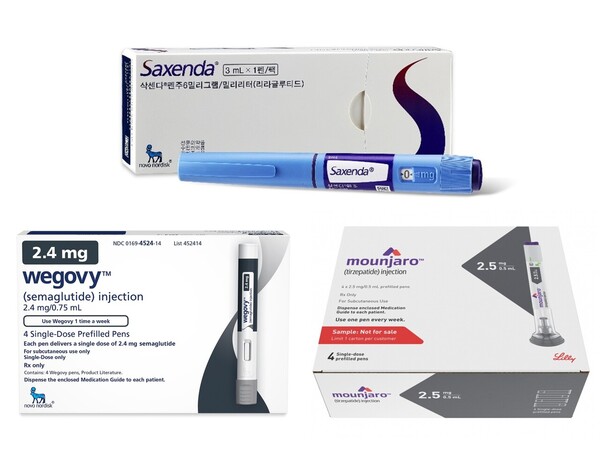Biopharma companies with GLP-1 (glucagon-like peptide-1) analogs, which have become a new trend in the obesity treatment market long dominated by appetite suppressants and fat-absorbance inhibitors, are upgrading their treatments.
One of the latest GLP-1 analogs under development is drawing particular attention by showing as many weight-reducing effects as obesity metabolic surgery, according to industry executives Friday.

Novo Nordisk’s Saxenda (liraglutide) was the first GLP-1 analog to treat obesity. It won approval from the Ministry of Food and Drug Safety in 2017.
The Danish drugmaker found that liraglutide showed outstanding weight-reducing effects when used as a diabetes treatment (Victoza) and turned it into an obesity treatment. When it first appeared, the drug won a nod to prescribe for obese patients with an initial body mass index of 30kg/㎡ or more or overweight adult patients with a BMI from 27kg/㎡ to 30kg/㎡ having one or more weight-related comorbidities.
According to the SCALE study, the basis for approving Saxenda, 3,731 patients administered with Saxenda 3mg for 56 six weeks lost at least 5 percent of the weight, and nearly half of them remained so for three years. Encouraged by such results, Saxenda expanded its indication to adolescent patients aged 12-18 with BMI equivalent to 30kg/㎡ adults and weighing 60kg or more in December 2021.
Saxenda recorded a domestic sale of 42.4 billion won ($32.4 million) in the first three quarters of 2022, dominating the market with a 34.4 percent share. However, Saxenda has the limitation of having to self-administer it every day, forcing Novo Nordisk to develop an upgraded medicine with less administrative frequency with enhanced effects.
The follow-up substance, semaglutide, has been developed into Ozempic as a diabetes treatment and Wegovy as an obesity treatment.
Wegovy won approval from the U.S. Food and Drug Administration to treat obese adults in June 2021 but has yet to get a nod in Korea.
Wegovy’s approval was based on the STEP study. In the clinical trial, Wegovy reduced subjects’ weight by an average of 17-18 percent over 68 weeks, improving from Saxenda.
However, the participants in the STEP study were severely overweight with an average BMI of 37~38kg/㎡, and the clinical trial was conducted according to overall Western obesity standards. Pointing out these problems, some experts pointed out that the new treatment is not appropriate for the Korean treatment standard suited for overweight patients with a BMI of 30kg/㎡ or more with a BMI of 27kg/㎡ or more, having one or more weight-related comorbidities.
To resolve these problems, Novo Nordisk won the ministry's approval for Korea-customized clinical trials in October 2021 and has been conducting them. The clinical trial is a double-blind, randomized, placebo-controlled study to assess the efficacy and safety of administering semaglutide 2.4 mg in 150 obese Asian patients weekly.
As it was a Korea-customized clinical trial, the company set the obesity standard to suit the domestic guideline of BMI 25kg/㎡.
Wegovy, which seemed to sail smoothly, hit a snag after announcing follow-up data in May 2022.
According to the U.S. National Institute of Health (NIH), after analyzing weights and cardiovascular, metabolic risk factors a year after suspending the Wegovy treatment, patients regained two-thirds of the lost weight on average, and their cardiovascular, metabolic risk factors also returned to similar levels to changed weights.
“The study confirmed that obesity has a chronic factor,” NIH researchers said. “Continuous treatment is needed to maintain improvement in weight and health.”
Eli Lilly, frontrunner in commercializing GLP-1 analogs, eyes obesity treatment market
Eli Lilly has long dominated the GLP-1 analog market with its diabetes treatment Trulicity (dulaglutide). The company has also developed Mounjaro (tirzepatide) as the follow-up product of Trulicity.
Mounjaro targets both GLP-1 and GIP. It has won approval to treat diabetes but has yet to get a nod for obesity treatment.
However, the publicized research shows the treatment’s growth potential in the obesity treatment market. In the American Diabetes Association’s annual academic conference in June 2022 (ADA 2022), the U.S. company announced the result of its SRUMOUNT study conducted on obese patients with a BMI of 30kg/㎡ or more or those with BMI of 27kg/㎡ or more having one or more weight-related comorbidities.
As a result, 97.7 percent of patients in the Mounjaro group confirmed weight loss, with half losing 20 percent or more and one-third losing 25 percent or more.
“Among medicines approved, liraglutide shows significant effects. However, semaglutide will show greater weight-reducing effects than that,” said Professor Park Cheol-young of the Endocrinology Department at Kangbuk Samsung Hospital. “Tirzepatide is showing even higher data than the two. In some patients, it shows a weight-reducing effect of nearly 30 percent, a level expected when conducting obesity metabolic surgery.”
Park added all these show obese people can reduce weight to a certain extent without surgeries. “Not only adults but obese teens can have weapons to make society healthy,” he noted.
However, he emphasized that medicine should not be the main treatment for obesity.
“No matter how much medication you take, you'll get back to your original state after you quit the medication if you can't correct your lifestyle,” Park said. “That explains why taking care of your lifestyle is essential."
Related articles
- ‘Korean society stigmatizes obesity but ignores its risks’
- 'Novo Nordisk to double diabetes drug market share in Korea by 2025'
- Weekly obesity treatment Wegovy lands in Korea
- Korea to face shortage of Lilly's diabetes drug Trulicity from July
- Diabetes drug Mounjaro landed here. But can Koreans use it?
- Regulator keeps close eye on GLP-1 weight loss drugs' possible link to suicidal thoughts
- How will Wegovy fit into obesity society’s guidelines in Korea?

